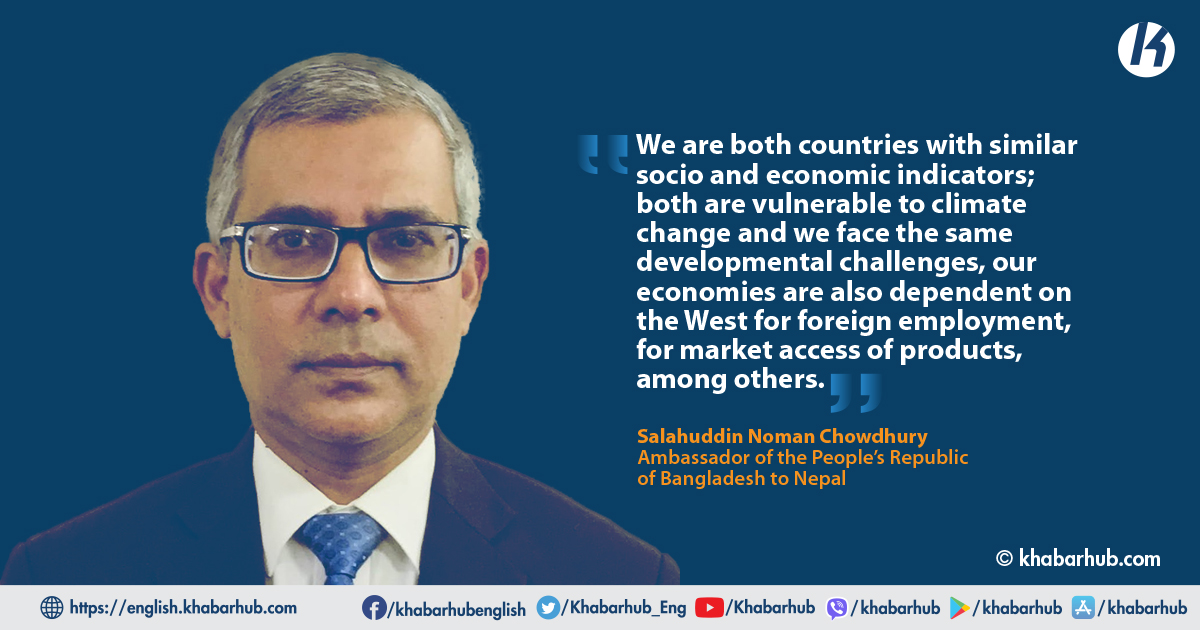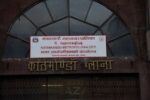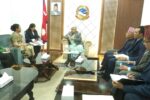Salahuddin Noman Chowdhury is the Ambassador of the People’s Republic of Bangladesh to Nepal.
Before taking up this assignment, he held the position of Director General (Administration) at the Ministry of Foreign Affairs in Dhaka.
In his diplomatic career of 23 years, he worked in various capacities at Bangladesh Missions in New Delhi, Islamabad, New York Consulate and New York Permanent Mission.
In the headquarters, he held positions like Director General (External Affairs), Director (Economic Affairs), Director (South East Asia) and Deputy Chief of Protocol (Visit).
Dr. Pramod Jaiswal, Strategic Affairs Editor at Khabarhub, spoke to Salahuddin Noman Chowdhury, Ambassador of the People’s Republic of Bangladesh to Nepal, on “Nepal-Bangladesh Relations”.
How would you define Bangladesh’s foreign policy towards Nepal? Where does Nepal stand in Bangladesh’s foreign policy?
Nepal is one of the most dependable friends of Bangladesh. We have this root in our civilizational linkages. We share the same values, traditions, and we share the same ecology, environment and the historical linkage of our relationship.
Nepal had provided us with support during the war of liberation in 1971 and that was a very crucial time in our national life.
After the war, Nepal was one of the first countries to recognize Bangladesh. So, we always recall the contribution of the Nepali people and the government with deep gratitude and we consider Nepal to be one of our best friends.
For that reason, we always want to build a greater partnership with Nepal in areas of trade, tourism, education, energy corporation, and so on. And that will continue to increase in the days ahead.
Since Nepal and Bangladesh will soon be graduating from the LDC status and it is all sent to be the next Asian tiger, what are the prospects of collaboration between Nepal and Bangladesh? How can Nepal benefit from it?
This is one of the areas of our closeness. We are both countries with similar socio and economic indicators; both are vulnerable to climate change and we face the same developmental challenges, our economies are also dependent on the West for foreign employment, for market access of products, for our technology, finance, and we are also dependent on foreign countries for education and training.
So, now that we will be graduating from the LDC group in the next few years, in 2026 December, we will be in the same boat again with Nepal.
But this time, I think our journey will not be that smooth because of the international support measures that we have been receiving over the years since our inclusion in 1975 as LDCs like market access of our products to European and other developed nations, and receiving concessional loans for our developmental projects, and receiving technological support, etc, will not be there anymore.
We will also receive the facilities that we have under the rules of origin under WTO. That will be quite challenging for both Bangladesh and Nepal in the post-graduation period.
So, to face the challenge, I think we will have to take a very well-coordinated approach and we have to speak in the same voice on the international platforms as we did previously during our LDC time.
And in the meantime, between our economies, we have to create complementaries and interdependence so that we can face those shocks much easier than we are facing.
Also, what we are trying to do is we are trying to increase our regional trade in the region under SAARC AND BIMSTEC.
And as a matter of fact, we are negotiating a preferential trade agreement with Nepal currently which we will be signing very soon.
Apart from that, as a national strategy, Bangladesh is trying to diversify its product base, export market product base as well as, we are also trying to diversify our destinations in different parts of the world.
As of now, we are mostly exporting to countries in Europe and America and we are trying to find new markets in Latin America, the Middle East, and Southeast Asia for diversifying these export nations.
So, these are the strategies that we have taken. I believe Nepal is also taking the same strategies since we are on the same journey in the same boat.
Bangladesh celebrates 50 years of independence this year. How has Bangladesh evolved in the last 50 years?
This definitely is one of the areas of our pride. Bangladesh has really made tremendous developments in the last 50 years.
Our GDP is now very high compared to what it was in the past. We have achieved spectacular social and economic development.
Now, we are also referred to as one of the outstanding examples of growth and development in international platforms. When we were born in 1971, we were regarded as an economic basket case. But, things have changed.
At that time, we had poverty and hunger and we experienced political instability for quite some years. Thereafter, the situation was very hopeless at that time and as late as the 1990s, our poverty was about 50% plus, so it has reduced to below 20% in the last 30 years.
Now, our population growth is well below 1.5% and we are now the second biggest economy in South Asia, after India.
A very recent publication by an international organization says that Bangladesh may become the 24th economy of the world by 2036 if everything goes as it is going right now.
If you ask me what actually was behind this, I would say that the political leadership which has ensured the stability of the country for the past 12-13 years, that was crucial for our development.
And also, the government had a tremendous emphasis on the small and medium enterprises which has contributed to this development and above all, our emphasis on women empowerment was very crucial and we have made significant progress in terms of our primary enrollment, girls’ education, child mortality, maternal mortality, primary healthcare, etc.
And our present life expectancy is about 72 years which was 56 years in 1971 if I recall correctly. In implementing the Millenium Development Goals MDGs, Bangladesh was very successful.
Most of the MDGs was attained by Bangladesh well before the target year of 2015. And now, Bangladesh is now well on track to achieve the SDGs by 2030.
So, when such a social development was taking place, we had the garment industry, which flourished in Bangladesh, and in 20-30 years’ time, we have become the leading tailor house in the world. We had some compliant issues in the meantime; we had some hiccups, as there were some accidents.
But, we addressed those issues with the right perspective. Now, you’ll be happy to know that many Bangladeshi factories have become compliant and as per the list of the ISO certified companies, you will see that out of the 10 most compliant factories of the world, Bangladesh has seven.
So, that is quite remarkable for us achievement that was made in the last 10-15 years. And now, with all this, Bangladesh has become one of the most favorable destinations for manufacturing farms.
We now have a very large pool of skilled workers and we are graduating to second generational industrialization like we are building pharmaceutical factories, we have already entered into the world electronics market, leather products market, as well as the IT market.
We are exporting our IT and IT-oriented services to the world. We have also entered into the area of furniture making.
So, these are the new industries that are coming up in the country because of the skilled labor base that has been created over the last three decades.
And while these developments were taking place in the industrial sector, there has been tremendous development in the agricultural sector also. In 1971, we were not self-reliant. We were dependent on importing food from other countries.
But now, after 50 years, when our population has more than doubled, we have achieved self-reliance in food, and as a matter of fact, we are exporting food grains to other countries as well. So, this is our story of development in the last five decades for which we feel very proud.
Despite being neighboring countries and sharing almost fifty years of relations, why hasn’t Nepal and Bangladesh been able to expand their bilateral trade?
This is one area, which is very embarrassing for me as well as the Nepalese ambassador in Dhaka. When we share our notes with each other, we feel very embarrassed to face this question but this is the reality that despite being very close countries, despite having so much comfort in our relations, we have not been able to explore the opportunity of our good relations into expanding our trade.
So, there may be some reasons. I think, as developing economies, we both have focused, in our initial years, on the areas of garments, food processing, or agricultural products in the initial last 3-4 decades.
And these are products which are low value but heavyweight products and we were competing with each other for a market in other western countries.
It was not viable to trade between our two countries. And again, our focus was mostly on expanding the market in the western countries, where we could export products that required labor-intensive production. So, that is why we did not focus on the region.
Now, in the changed context when our export market in the western countries is shrinking and at the same time, when we have already attained our capacity and we have a qualitative improvement in our products, I think this is the time for us to expand regional trade and you will be happy to know that regional trade is also increasing.
Our export to all the regional countries has increased in the last few years. The same has been the case in other regional countries. Regional trade is increasing, although not at a very satisfactory level, it is increasing.
Since both Nepal and Bangladesh are members of the WTO, BIMSTEC, and SAARC, How can the countries use such international and regional forums to enhance regional and bilateral trade for creating investment opportunities?
Through the World Trade Organization (WTO), we work with Nepal very closely. We worked unitedly for the continuation of the international support measures that we have been receiving at the WTO for our access to other countries, developing countries, developed countries, for our pharmaceutical products, and we have been successful in extending the deadlines.
Similarly, we have to work together in extending all the support measures and continuation of the support measures. Thus, we have to work very closely with each other and BIMSTEC and SAARC are the two platforms where we can work together to increase regional trade and take it to a higher level. We can work in areas of investment, tourism, Energy Corporation, agricultural corporation, and so on.
How can Bangladesh support and co-work with Nepal in the sector of commerce, energy, and tourism? How do you see the prospect of future collaborations between the two countries in these sectors?
Bangladesh is very eager to enhance the present volume of trade with Nepal. Bangladesh is trying to negotiate a deal on preferential access of our products to Nepal and Nepalese products to Bangladesh.
And I think if that is signed, our volume of trade will enhance greatly. Currently, we are buying products from faraway countries which take very high costs so if we have more trade, it will be to our mutual benefit as we will get products at a cheaper price.
On the issue of energy, as we have said, we are very eager. I think there are a couple of reasons. Firstly, Bangladesh is an energy-hungry country and as our development takes place, we need more energy but we do not have the capacity to produce energy on our own because we don’t have the natural resources to produce energy.
So, we are an energy-hungry country and our energy consumption will increase substantially in the next 5-10 years time.
So, if energy can be produced in Nepal, it has huge potential for electricity, then we can import those through the Indian grid or as a dedicated grid from Nepal to Bangladesh and that is one thing.
Secondly, it also helps us to fulfill our commitment for clean development as in the Glasgow COP also, we have committed that we will go for clean development like many other countries.
So that is if we can import energy from Nepal, that helps us to fulfill our commitment to low carbon development.
Thirdly, it is a very win-win proposition for both Bangladesh and Nepal because we will get Nepalese electricity at a much cheaper price.
So, we are very interested to get energy cooperation, to get electricity from Nepal. In areas of tourism, I think we are working on two issues; we are trying to attract more tourists to Cox’s Bazar, Sylhet and Sundarbans.
Nepal is the most favorite destination of Bangladeshi tourists, but not many Nepalese tourists go to Bangladesh because of our capacity constraints.
And now that our capacity is increasing in those areas, we are trying to attract more tourists to Bangladesh and to facilitate them; I think we are trying to connect more cities through the air.
We are working on connecting Saidpur-Biratnagar airports and also the Sylhet airport and Cox’s Bazar airport with the Nepalese airports.
So, if that materializes in the next few years, I think the tourism between both countries will increase substantially. It is already good, but it will increase.
What are your impressions of Nepal and Kathmandu in particular? How has your stay been so far?
Nepal is a great country. It has rich values, traditions; it has a rich culture, and most importantly, it has a glorious history.
Nepal is a vibrant democracy and apart from its rich cultural heritage, Nepal is a country that has multiple languages.
So, it manages all the languages very well. It has proved that diversity is its strength and different communities live in peace in Nepal.
So, this is exemplary for the world. So, I feel very happy to live in such a country where we have a very enlightened and educated civil society, who have a deep appreciation for art, culture, literature, prose poetry and interacting with them every day is a great experience and I think that by living in Nepal, I actually improved myself with all the exposure that I receive daily in my interaction with civil society or the people of Nepal.
But most importantly, what is most attractive for me is that the people of Nepal are very cordial, friendly and hospitable.
So, for any foreigner, not just me, Nepal is one of the most comfortable countries to live in and to live here with 24 hours air conditioning free of cost is another opportunity.
So, this is one of the best countries for any diplomat to be posted in a very beautiful country. Nepal is definitely one of the most beautiful countries with so many enlightened and warm people around, you will be very comfortable and happy.
Watch video:









Comment